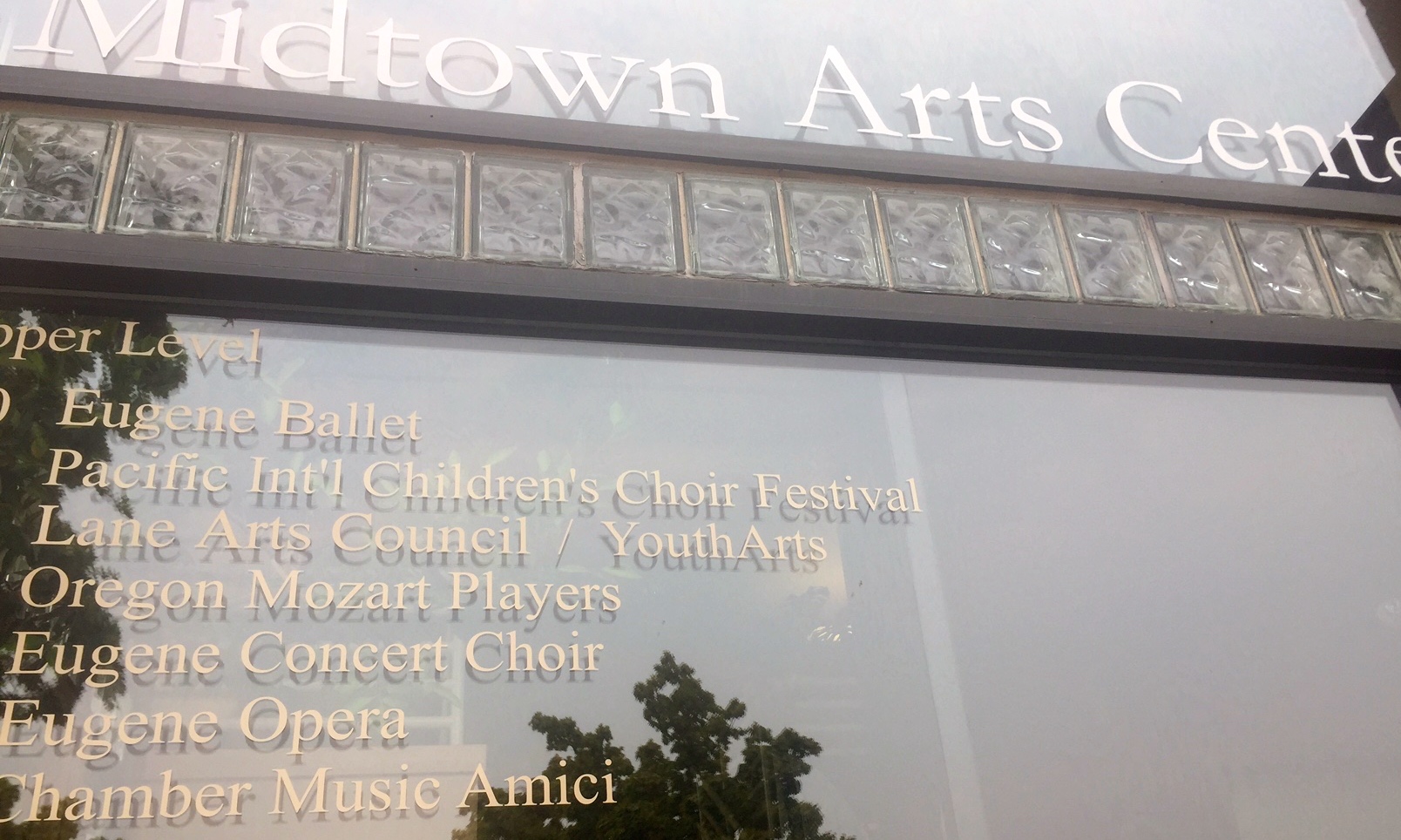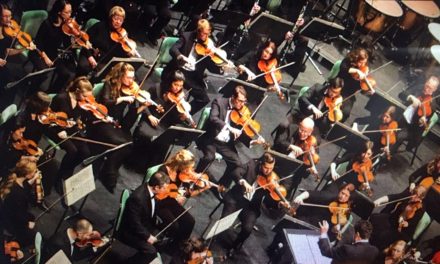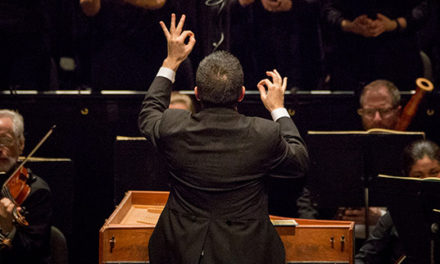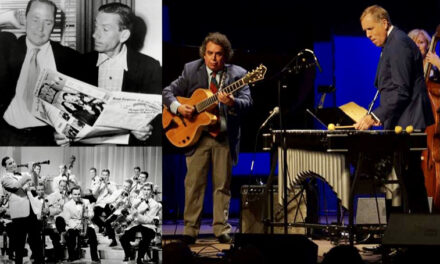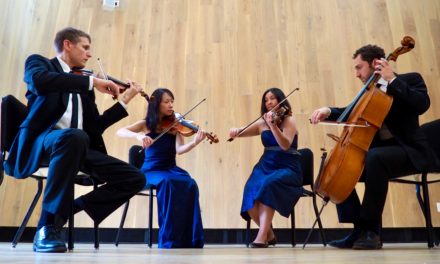(Above: Eugene Opera is one of several nonprofit arts organizations that share space in the Midtown Arts Center at 16th and Willamette streets in Eugene.)
By Randi Bjornstad
Opera is famous for running the gamut between tragedy and comedy, but that usually refers to the plot.
However, early this year it appeared that Eugene Opera itself might be teetering on the brink of catastrophe as it cancelled the last half of its 2016-17 season in the face of a $165,000 deficit, owed mostly to performers and local businesses.
Now, a happy ending seems just as likely.
The nonprofit opera company’s board of directors announces that thanks to the generosity of donors of all financial abilities, its past debts have been cleared. In addition, a new staffing arrangement — including a Eugene-based executive director — is in place. Pledges for just under half of the cost of producing the 2017-18 season already have been secured, and two popular opera productions, one traditional and and another contemporary, have been penciled into the calendar, the first at the end of December and the second in May.
“It’s a good news-bad news kind of thing,” opera board president Barbara Wheatley acknowledged during a Labor Day weekend telephone interview. “The good news is that 45 percent of the money we need for the coming season is already in place. The bad news is, we still have to raise the other 55 percent, and we cannot become complacent about that.”
However, Wheatley believes that months of hard thinking and noodling and rigorous self-evaluation have put Eugene Opera “in much stronger shape than it’s been for years.”
“The reality with opera and other arts groups is that the financial challenges never seem to end,” she said. “But we feel now that we are in a very good place, with a stronger sense of what the community wants from us, people who will be working here day-to-day to keep us on track, and a financial foundation that we can build on going forward.”
Perhaps the most significant decision in turning the opera back to financial stability was to hire an executive director who will live and work in the Eugene community, devoting time to fundraising and financial support, community outreach, and monitoring day-to-day operations, Wheatley said.
For years, the company had a general director in Mark Beudert, whose grasp of opera and opera production was unassailable, but who by necessity jetted in and out of Eugene while living in Indiana as a member of the opera faculty at the University of Notre Dame.
As the opera underwent its financial crisis in January, Beudert supported the idea that an in-house administrator was one key to future success.
The person chosen to fill the new post of executive director is Erika Rauer, who officially begins her new job on Sept. 7.
The other major change in personnel at Eugene Opera is expanding the role of Andrew Bisantz, the company’s longtime conductor who lives in Florida and has a large network of contacts throughout the opera world, who also will become the organization’s artistic director.
New face in town
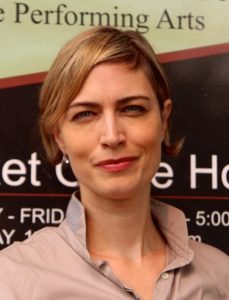
Erika Rauer is Eugene Opera’s new executive director (Photo by Randi Bjornstad)
Erika Rauer, the opera’s new executive director, moved to Eugene in mid-August and already feels at home.
“I want to build relationships between opera and the people here in Eugene,” said Rauer, a soprano who grew up in Delaware and who “fell in love with singing at age 14” after first studying violin, following the example of her violinist mother.
“When I transitioned to voice, it was like unwrapping a present,” Rauer said. She went on to earn a master’s degree in voice and also embarked on a career in arts administration.
She most recently guided the Community Arts Collaborative at the University of North Carolina Greensboro, creating programs for community outreach and also spearheading income generation for a variety of musical programs.
Earlier in her career, before her graduate work at Yale University, Rauer taught in public schools in New York City as part of the Dreamyard Project, which she described as “the biggest nonprofit arts project in The Bronx.”
Even so, “When I started, I worked out of a janitor’s closet,” Rauer said with a laugh. “When I returned to New York after graduate school, I started doing a lot of the same things with the New York Opera — we brought kids to real productions and had working singers doing residencies in the schools.
“The kids would write their own operas by changing the stories of real operas and writing their own new songs, then performing them. That experience led me to pursue arts administration.”
Her husband, Craig Phillips, is a bass-baritone with the New York Polyphony. As of fall term, he will be on the faculty of the University of Oregon School of Music and Dance. The couple have two young daughters.
“It’s exciting to have an opportunity like this,” Rauer said. “I think the (Eugene Opera) board was looking for people to be very hands-on, and a lot of my work has been very grass roots in nature.
“I like to look for solutions and make them happen.”
Expanding horizons
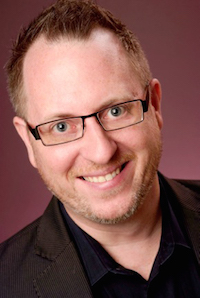
Conductor Andrew Bisantz expands his position this year at Eugene Opera, also becoming Artistic Director (Photo courtesy of Eugene Opera)
Like Rauer, conductor Andrew Bisantz sees his elevation to artistic director at Eugene Opera as a challenge to maintain what has been successful in the past while encouraging existing opera aficionados to appreciate new works and attracting people who haven’t been operagoers in the past into the fold.
“Being named artistic director isn’t just a ‘title bump,'” Bisantz said. “I will be making final decisions on some things, and I hope not only to keep on doing the kinds of operas that people traditionally enjoy but also to work to make people comfortable with the new, exciting things that are happening in opera generally.”
As an example, he mentions Herschel Garfein, a Grammy Award-winning composer, librettist and director who has written an opera based on the Tom Stoppard play, “Rosencrantz and Guildenstern Are Dead” and who also did the libretto for Robert Aldridge’s “Elmer Gantry.”
“I hope to bring a lot of lesser-known works to the Eugene community in the form of festivals of music by composers that can lead eventually to the performance of their main (operatic) works,” Bisantz said.
He supports the concept of returning, at least temporarily, to the idea of doing one mainstage production in the Silva Concert Hall at the Hult Center for the Performing Arts each season — “something everybody loves,” he said — along with one smaller production that may not be quite as well known, to be performed in the Hult Center’s smaller Soreng Theater.
“I hope we will be able to strike the right balance between masterworks and newer works, recognizing that right now we are certainly in a ‘golden age’ of American contemporary opera, which I believe the community here can be ready to enjoy.”
As for opera in general, “Finances always have been a struggle, and they always will be,” Bisantz said. “There’s an old saying, ‘The only thing more expensive than war is opera.’ We will take care to balance our fundraising, grants and ticket sales — the board, the community and the volunteers at Eugene Opera all have said they want opera in the Eugene area to grow and thrive.”
Bisantz lives in Florida, where he has been involved for years with Florida Grand Opera, as well as conducting orchestras throughout the country. With his new position, he said he plans to spend more time in Eugene.
Combining Rauer’s background in development, donor relations and grant-writing with his finger on the pulse of the opera world, “I think the future of Eugene opera will be good,” he said. “Whether I am in Eugene or not, we will be working together closely every day.”
As for continuing his role as conductor of Eugene Opera, which he has been doing since 2008 and where he has conducted 17 productions, Bisantz simply wants to keep on with his goal of maximizing the performances of both singers and orchestra.
“When I was in graduate school, one of my professors told me never to stop looking at the stage, even though I was conducting the orchestra,” he said. “He told me my job is not one or the other, it is to take what I see onstage and help the orchestra to support and enhance that for the audience.
“Throughout my career, that has always stuck with me.”
Eugene Opera 2017-18 season
The Barber of Seville, by Gioachino Rossini: 2:30 p.m. on Dec. 30 and 7:30 p.m. on Dec. 31, in the Silva Concert Hall at the Hult Center for the Performing Arts; light-hearted comedy features the clever barber Figaro helping a pair of young lovers outwit a wicked guardian
María de Buenos Aires, by Ástor Piazzolla: 7:30 p.m. on May 4 and 2:30 p.m. on May 6, in the Soreng Theater at the Hult Center; tango operetta by Argentinian composer features an intoxicating blend of music, poetry and dance, celebrating the joy, sadness and mystery of life
Tickets: On sale to the general public on Sept. 28, available at the Hult Center box office, 541-682-5000, or online at hultcenter.org/
Information: eugeneopera.com/

